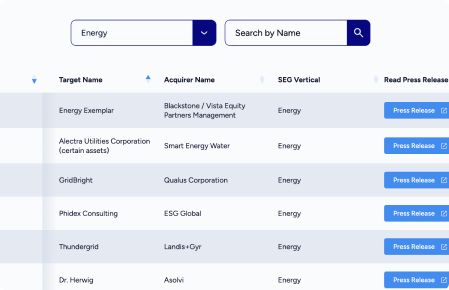Whether you are looking for a majority recap or strategic sale, have a buyer and just need help uncovering hidden value and navigating potential pitfalls, or just want insights on how to grow and scale your software business, we’re here to help.
SEG Research & Insights

SEG 2024 Annual SaaS Report
The Data Shows SaaS is Here to Stay
In 2023, M&A activity surged, marking the second-highest transaction count, closely following 2022. The SEG SaaS Index™ soared, posting an impressive 34% growth for the year.
Explore What’s Trending
Stay Up-to-Date on the Latest Market Trends
Subscribe to the latest trends that impact the software market and business valuation.
BROWSE CONTENT BY SECTOR
Education
Energy
Government
-
INDUSTRY INSIGHTSLearn about the SaaS Government sector, including latest industry trends and data, all in one place.
-
MARKET MAPSurvey our list of Government SaaS vendors and sector categories on our interactive page.
-
SEG TRANSACTIONSSee all of our closed deals to take a closer look at our track record in the Governement sector.
Healthcare
Manufacturing
-
INDUSTRY INSIGHTSAcquire valuable insights into the Manufacturing sector through our thorough analysis and viewpoints.
-
REPORTExplore the current state of industrials & manufacturing, complete with market maps, industry trends, M&A tailwinds, and more.
-
CLIENT VIDEOListen to the personal story of one Manufacturing founder and their M&A exit journey.
Real Estate
-
INDUSTRY INSIGHTSGain valuable insights into the Real Estate sector with our in-depth analysis and expert perspectives.
-
CLIENT VIDEOStep into the shoes of a SaaS Real Estate founder as they share details of their successful exit.
-
CLIENT VIDEOJoin an industry founder on their personal M&A exit story, offering insights into the process.
BROWSE CONTENT BY TOPIC
Finance & Valuation
Insights & Trends
SEG WEBINAR
How Top Performing SaaS Leaders Create Sustainable Avenues to Drive Growth
M&A Process
Strategy & Growth
Expertise That Elevates Every Endeavor
It’s time to talk about your company’s future.
Fill out the form and we’ll discuss…
- Multiples and interest
- Buyer dynamics and priorities
- Valuation insights







